I. History
The origin of the School of International Studies could be traced as far back as 1985, when it began as the Foreign Language Teaching and Research Section under the Department of Fundamental Courses at Xi’an Shiyou University. In January 1997, it was reorganized into the Department of Foreign Languages, and in May 2012, it was elevated to the School of International Studies. Over the years, the School has achieved remarkable progress in language teaching, academic research, talent cultivation, and social services, and has become an important pillar of foreign language education at the university.
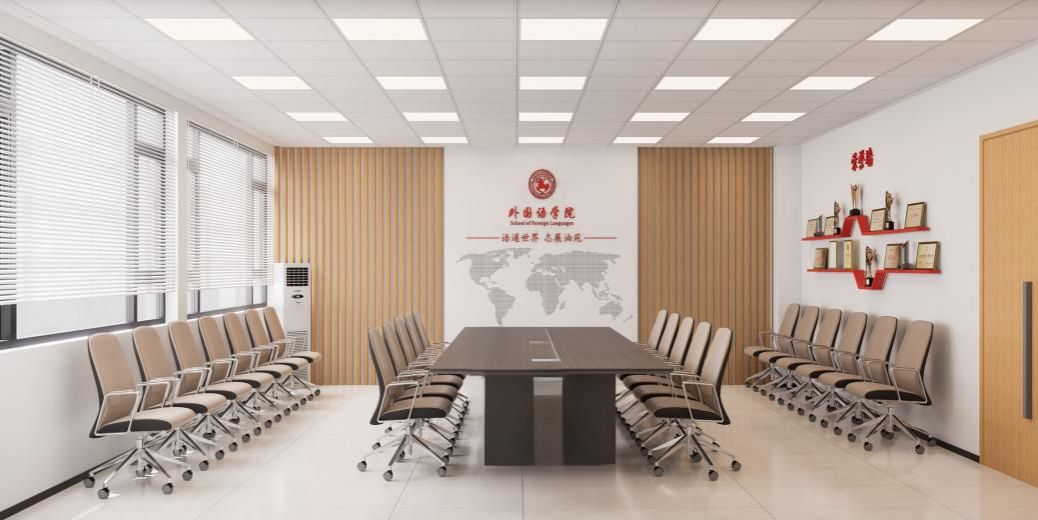
西安石油大学外国语学院
School of International Studies, Xi’an Shiyou University
II. Discipline Construction
(1) Disciplinary System
Centered upon the discipline of Foreign Languages and Literatures, the School expands into the discipline of Area Studies, thus creating a multi-disciplinary coordinated development pattern. In 2014, the School was granted the authorization to confer the Master of Translation and Interpreting (MTI) degree. In 2021, it was approved as a National First-Class Undergraduate Program Construction Site (English). The School offers courses in nine languages, including English, Russian, French, German, Japanese, Spanish, Korean, Arabic and Italian. Integrating the discipline of Area Studies, we aim to cultivates students’ cross-cultural competence and international vision.
(2) Distinctive Features and Interdisciplinary Strengths
Building on the national strategy of petroleum internationalization, the School specializes in English/Russian translation and research for petroleum-specific purposes. Leveraging the university’s strengths in energy disciplines and its extensive experience in international collaborative training, we employ the methodologies in Area Studies to conduct systematic research on the languages, cultures, and socio-economic systems of petroleum partner countries. This has fostered a distinctive “Foreign Languages + Energy” interdisciplinary profile, providing robust linguistic and cultural support for the internationalization of the petroleum industry.
(3) Degree Programs and Talent cultivation
The School offers a professional Master of Translation and Interpreting (MTI) degree program. We plan to prioritize the development of the Area Studies discipline, and enhance the platform for cultivating high-level talents in the future. Focusing on the national energy strategy, we aim to cultivate versatile talents in fields such as international organizations, international communication, area studies, and foreign-related rules of law. We concentrate on teaching and research in the fields of international energy governance and international energy communication.
III. Faculty and Staff
The School currently has a total of 103 faculty and staff members, with 94 full-time teachers. Among them, 22 hold senior professional titles, including 4 professors and 18 associate professors. The School boasts 12 postgraduate supervisors. Sixteen faculty members hold PhD degrees, 87 have Master’s degrees, and 11 are doctoral candidates. The faculty has won numerous awards, including 1 National Outstanding Teacher, 1 Shaanxi Provincial Teaching Master, 1 Shaanxi Provincial Outstanding Teacher, 1 Model Worker, 1 Outstanding Teacher, and 1 Outstanding Young and Middle-aged Backbone Personnel granted by China National Petroleum and Natural Gas Corporation, 1 Outstanding Returnee Scholar of Shaanxi Province, and 2 university-level Teaching Masters. In recent years, the School has proactively recruited faculty members with professional backgrounds in petroleum engineering, area studies, international communication and other related fields to strengthen the teaching staff and enhance discipline construction. Through various initiatives, the School has strengthened teacher training and academic exchanges, thereby improving teaching and research capabilities of the faculty.
IV Teaching and Research
(1) Remarkable Achievements in Teaching
In 2021, the School won the honor of “Advanced Collective for Undergraduate Teaching Management in Shaanxi Province”. It has been successively awarded 1 National Second Prize for Teaching Achievement Award, 1 Provincial Grand Prize for Teaching Achievement Award, 1 Provincial First Prize for Teaching Achievement Award, and 4 Provincial Second Prizes for Teaching Achievement Award. In curriculum development, the School has been approved 4 provincial first-class courses, 3 provincial curriculum-based core value cultivation model courses, 3 provincial teaching teams, 7 university-level first-class courses, and 9 university-level curriculum-based core value cultivation model courses. The School has been continuously promoting teaching and research projects, accomplishing 2 industry-university cooperation projects of the Ministry of Education, 3 provincial teaching reform projects, 15 university-level teaching reform projects, and has published 7 university-funded teaching materials. Faculty members have demonstrated outstanding teaching capabilities, with 26 teachers receiving awards in national foreign language teaching competitions (including the FLTRP “Star Teacher Contest” and other prestigious contests) over the past three years.
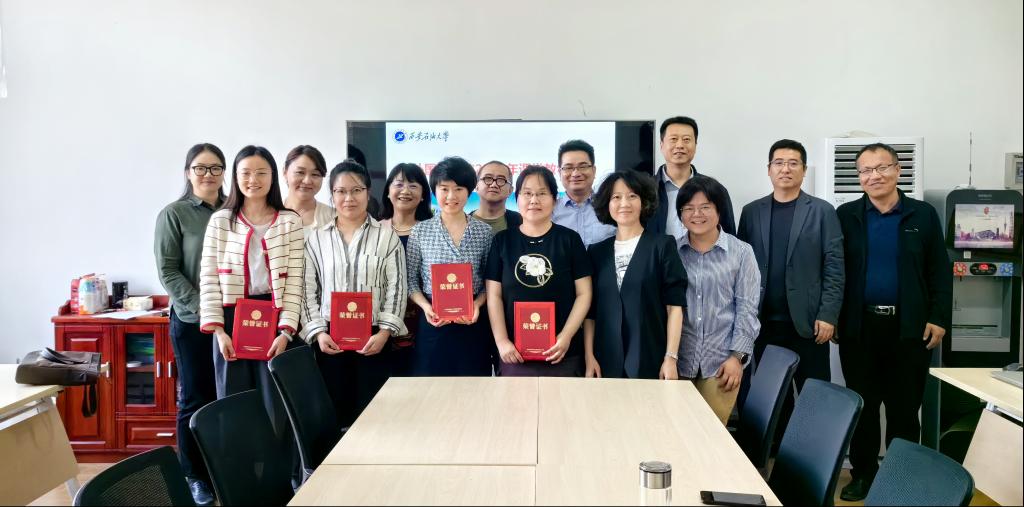
Teaching Skills Competition
(2) Fruitful Achievements in Scientific Research
Leveraging its strengths in language disciplines, the School has deepened innovation in interdisciplinary research paradigms, and systematically constructed five major research directions, viz. English for Specific Purposes in Petroleum, Applied Linguistics, Foreign Languages and Literatures, Applied Translation, and Area Studies. Since 2020, the School has achieved breakthrough progress in scientific research innovation, with more than 400 high-level papers (including 63 in core journals such as SSCI and CSSCI), 19 academic monographs, 6 translated works, and 10 teaching materials published. The School has been granted 2 national-level scientific research projects (including 1 project of the National Social Science Fund for Translation of Chinese Academic Works), 32 provincial/ministerial-level projects, 52 municipal/bureau-level projects, and 16 industry-commissioned applied research projects. It has also received 4 Second Prizes for Outstanding Achievement Award in Philosophy and Social Sciences of Shaanxi Province, 1 Third Prize for Outstanding Achievement Award in Humanities and Social Science Research in Higher Education Institutions of Shaanxi Province, and 1 Third Prize for Outstanding Achievement Award in Philosophy and Social Sciences of Xi’an. Additionally, the School has hosted 2 national academic conferences and organized more than 80 academic seminars.
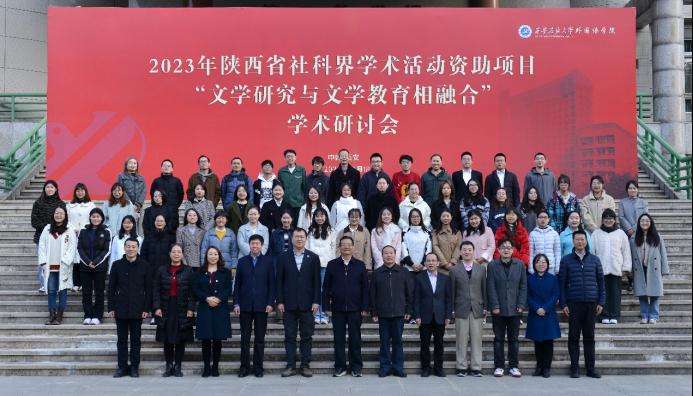
Academic Symposium on “Integration of Literary Research and Literary Education”
V. Education
The school currently has 802 full-time undergraduate students, 97 full-time master’s degree candidates, and 82 part-time master’s degree candidates. The employment rate has remained stable at over 90% in the past five years, and it has been consecutively awarded the university “Advanced Unit for Student Affairs and Employment”. The international education system has achieved remarkable results: it has established a “2+1+1” Dual-Degree Program with Gwangju University in South Korea and three top universities in Russia (Peoples’ Friendship University, Pushkin Institute, and Kazan University). It has jointly set up a Spanish Language Center with the University of Salamanca in Spain to directionally cultivate compound Spanish talents for the “Belt and Road Initiative”. It strengthens characteristic education in the energy field by offering courses such as international communication and energy diplomacy, introducing university-enterprise cooperation practice projects, and systematically enhancing students’ practical capabilities in the fields of “international energy governance” and “international energy communication”. Meanwhile, relying on the research advantages of Region and Area studies, it deepens students’ cross-cultural communication literacy and international vision, and constructs a cultivation model of “professional competence + strategic vision”.
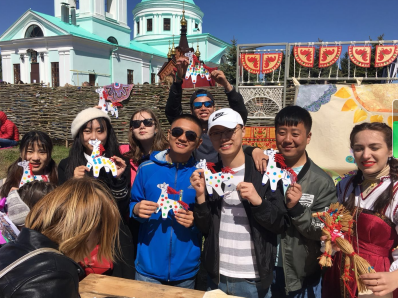
China-Russia “2+1+1” Joint Education Program
VI. Social Services
In alignment with the national oil industry’s internationalization strategy, the school harnesses university’s strengths in petrochemistry and foreign languages as well as its long-standing experience in training international cooperation professionals in language skills. It employs multiple measures to enhance social services, making significant contributions to local socioeconomic development. Since 1992, the school has taken on the task of English language training for personnel involved in overseas projects for China’s state-owned oil companies. In 1997, with China’s full-scale implementation of its internationalization, the school assumed a greater responsibility for providing foreign language training to its international cooperation managers and technicians, and led in formulating corresponding standards for such training. Over three decades, the school has continuously deepened its services, offering professional support of language training and translation services, cumulatively supporting numerous local entities such as Xinjiang Tarim Oilfield, Changqing Oilfield, Shaanxi Yanchang Petrochemical Company, and China National Petroleum Corporation’s First Construction Company as well as China National Offshore Oilfield Surveying & Testing Co., effectively facilitating their international business with solid linguistic backup and intellectual support.
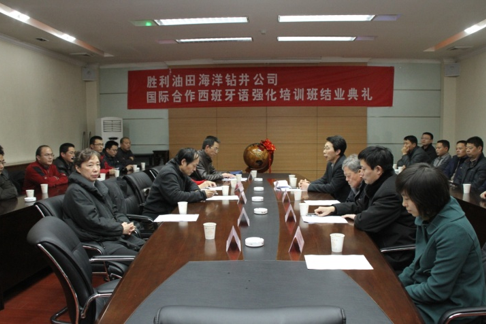
Language Training to Sinopec Corp. Shengli Oilfield Ocean Drilling Company
The school has always prioritized enhancing the social service capabilities of both teachers and students, actively organizing their deep participation in various major international events with language services. These include “the Fourth China-Silk Road International Expo”, “the Sixth China-Silk Road International Film Festival”, “the Eurasian Economic Forum”, and the Central Asian Summit in the fields of culture, economics, and politics. Leveraging its strengths in Region and Area studies, the school provides precise market research and consulting services for enterprises, effectively supporting their globalization business. Through diversified service practices, the school continues to boost the local socioeconomic development.
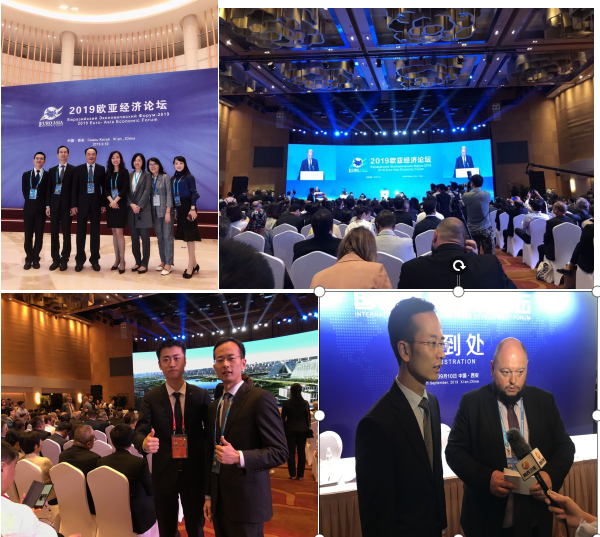
Language Services in the Eurasian Economic Forum and the Central Asian
Summit.

Language Services in the sixth International Silk Road Film Festival
VII. Party Building
The school adheres to the principle of “fostering virtue through education and development, focusing on party building to promote holistic growth”. It fully implements the educational guidelines of the Communist Party of China, upholding the fundamental mission of fostering virtue among people, and has constructed a “Party Building +” educational system and a comprehensive “five-sphere integrated” political theory curriculum structure. It has been recognized as a Model for the learning from Comrade Lei Feng, an excellent Party-Building Assessment by the university, a Model Group for faculty ethics, an outstanding Student Affairs Program, a Double Innovation Party-Building Branch, and a Model that promotes course-based political and ethics education. By strengthening its Party Building efforts, the school has enhanced its overall cohesiveness and capability, providing solid political support for the academy's development.
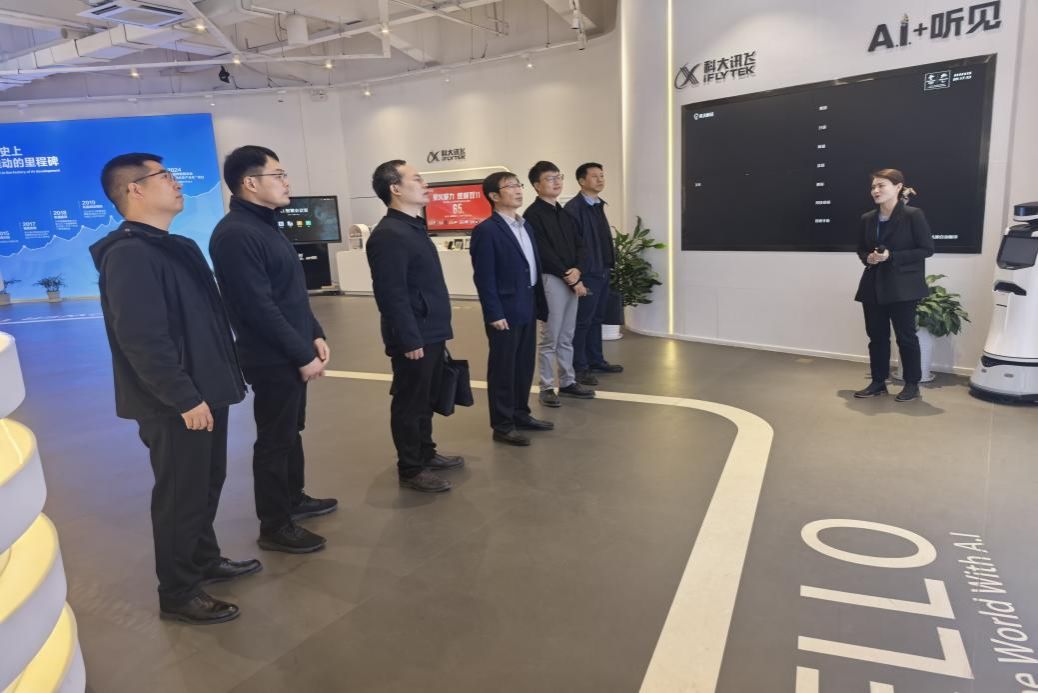
Visiting the iFLYTEK Co., Ltd., a listed company focusing on intelligent speech and technology
VIII. Future Prospect
Over the next five to ten years, the School of Foreign Languages will, anchored in national strategic requirements, draw inspiration from the university’s mission spirit, establish an four-point integrated core competency system, consisting of “International Organizations+ International Communication+Region and Countries Studies and +Extraterritorial Law”, focusing on the international energy governance and energy communication specialties. By strengthening faculty, innovating teaching models, and deepening industrial educational integration, it aims to comprehensively enhance the quality of student education. The School will deeply integrate itself into the “Belt and Road Initiative”, fully support the Central Asia Cooperation Education Program of the university, and aim to cultivate a select group of high-end foreign language talents who possess global vision, energy professionality, and cross-cultural communication abilities. These students will provide crucial human capital and intellectual support for serving the country’s energy globalization and participating in the construction of the global energy governance system, thus contributing to the school’s efforts towards becoming a high-level university.